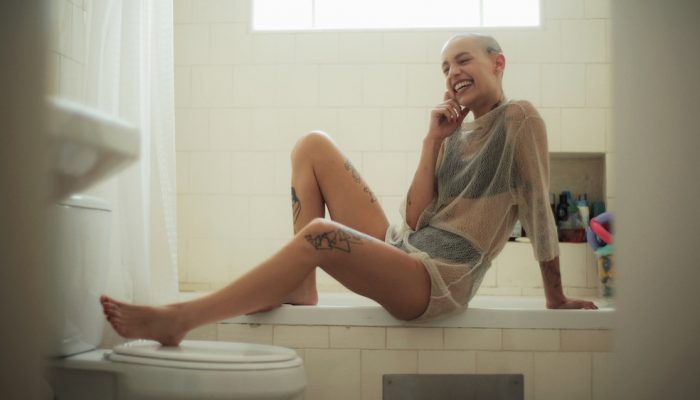How do you feel about sharing your not-so-good bits with the world?
This translates into all sorts of things.
For example, recently I wrote about comparing ourselves to perfect Instagram posts. You know the ones—the beautiful bodies, the just-out-of-a-style-magazine homes, the smiling families with not a snotty nose or juice-stained jumper in sight.
We know they’re not real (or not for long at least), but that doesn’t stop us from staring wistfully at the tiny screen and mentally challenging ourselves. It also influences what we feel comfortable sharing when things get tough—the rougher edges of the life we so carefully curate for the world.
Social media, of course, has played a massive part in what the world thinks and how much of our lives we share that we wouldn’t have done before. Would you have taken a picture of your breakfast on a disposable camera, waited seven days for it to be processed, and then gone ’round to 500 friends to show them your blueberries?
Unlikely.
But that’s what we do. It’s innocent enough, isn’t it? But all the while we are painting a picture of our world that before now people wouldn’t have seen, and when we get comments of “Oh, I wish my house looked like that,” or “I wish my partner bought me flowers like those every week,” or “If only my three-year-old would put his or her toys away like yours do,” we have built a picture, and, while true at the time (mostly, I reckon), it isn’t indicative of our everyday experiences.
This is where it becomes difficult to be vulnerable.
When the sh*t hits the fan, how do we feel about sharing the tougher side? It takes a huge amount of courage to display vulnerability in a society where perception rules, which is why we don’t see that much of it. It can often come as a surprise to see a friend or acquaintance who we think has a great life (great job, kids, partner, house, car, whatever) seemingly suddenly struggling.
We don’t handle it all well as a society, and I don’t think this is always because we don’t care enough. I think it scares us more than we’d like to admit.
“OMG. If they’re struggling and they have it all—what about me?”
How many times lately have we seen the smiling faces of star-studded celebrities in the media, only to be followed tragically with news of a suicide, overdose, or breakdown? Or hear the latest shocking statistics about the massive rise in male suicide? It happens.
Mental health lives on the inside. Not in the Instagram happy posts, not in the day-to-day passing in the street with a smile and a “How are you?” without waiting for an answer or an automatic “Great! how are you?”
Inside.
Tragically, it’s not always preventable and there won’t always be an outward sign of the struggles going on inside, which is why when we see a post showing vulnerability, we need to consider slowing down. If someone is sharing a not-so-perfect moment, would you take the time to react with a kind word or a personal message? An offer of a cup of coffee and a chat?
It matters. If they’re posting about it, then they want you to know. I have a bracelet that I acquired years ago from a girl in America, using her voice socially to promote a “Be Kind” message, and I wear it a lot. If you see me out and about, I’ve usually got it on. It’s not like I walk around staring at it and buying strangers coffee (although the coffee thing has been known to happen). It’s just a little visual prompt to look around now and again to see where I can help out.
If you’re struggling with something, ask! We’re all in the same boat, just at different distances from the shoreline—and believe me, it’s all scary. Scary to leave the safety of the coast, scary to sail into deeper waters, and scary to see the other shoreline in case it’s the end of the journey—but it’s also scenic, breathtakingly beautiful, and the adventure of a lifetime.
As humans, we are more socially connected than ever before and at the same time more spiritually and emotionally disconnected than ever before. It’s a weird balance, but we can put it straight. I’m not talking about acting as unqualified counsellors; most of us aren’t equipped for that, but then again most situations don’t call for that either.
On a bad day, a kind word or an offer of a little bit of help can make all the difference. And remember, if someone is courageous enough to post about it or to tell you about it, then they are willing to break the cycle of so-called perfection. Even though they probably don’t know it, they are the warriors leading the charge back to balance, and I for one salute them, because in their willingness to be vulnerable they are allowing the light in—and that’s where the healing starts.
Look for the vulnerability behind the stories, and be kind. If you’re struggling with something, then, while it may be scary or downright terrifying to show a crack in the life (or business) you’ve made publicly, the crack is where the light comes in, and, by your courage, you are giving permission to others to do the same.
The same 500 people who saw your post about your blueberries are reading your less-than-perfect posts too, and they just might need to hear it.
A great friend of mine posted these words this week, and they echo around my ears as I sit here and chat with you today, so I’ll leave you with them (thank you, Dan):
In a world where you can be anything, be kind.












Read 0 comments and reply